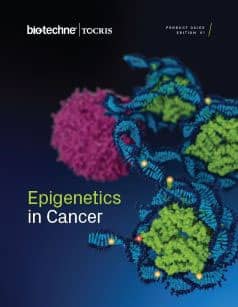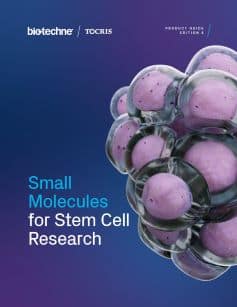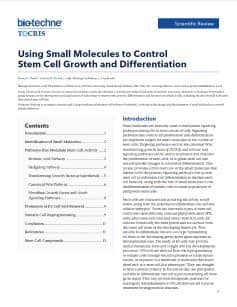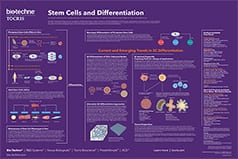Cancer Stem Cells
Cancer stem cells (CSCs), also known as tumor initiation cells (TICs), are undifferentiated cancer cells that can self-renew and differentiate into bulk tumor cells. They are thought to have a role in the resistance of tumors to therapy, and for disease recurrence.
| Cat. No. | Product Name / Activity |
|---|---|
| 5802 | A37 |
| ALDH1A1 inhibitor; disrupts spheroid formation of ovarian cancer cells | |
| 6868 | 8-Azaadenosine |
| ADAR1 (adenosine deaminases acting on double-stranded RNA) inhibitor; inhibits leukemia stem cell self-renewal | |
| 1623 | Cyclopamine |
| Inhibitor of Hedgehog (Hh) signaling; depletes stem-like cancer cells in glioblastoma | |
| 1368 | Geldanamycin |
| Selective Hsp90 inhibitor; breast cancer stem cell inhibitor | |
| 1803 | ITE |
| Induces stem-like cancer cell differentiation; also inhibits TGF-beta -induced human myofibroblast differentiation | |
| 5727 | MC 1742 |
| Induces CSC apoptosis; also stimulates CSC osteogenic differentiation | |
| 6429 | ML 210 |
| Induces ferroptosis in tumor initiation cells; glutathione peroxidases (GPX4) inhibitor; synthetically lethal HRAS compound | |
| 7874 | N-Acetylcysteine |
| Component of organoid culture media for NSCLC and CRC; also GSH precursor and antioxidant | |
| 5522 | Napabucasin |
| Blocks cancer stem cell self-renewal; STAT3 inhibitor | |
| 4079 | Niclosamide |
| Inhibits AML stem cells; STAT3 and mTORC1 signaling inhibitor | |
| 6538 | PF 04449913 maleate |
| Potent Smo antagonist; eliminates self-propagation capacity of AML cells | |
| 4189 | SC 26196 |
| Selective Δ6 desaturase inhibitor; eliminates cancer stem cells from ovarian cancer cell lines | |
| 3070 | Thioridazine hydrochloride |
| Selective inducer of CSC differentiation; anticancer agent | |
| 5960 | TMI 1 |
| Selectively cytotoxic towards CSCs | |
| 5328 | TY 52156 |
| Inhibits S1P-induced breast cancer stem cell expansion; S1P3 receptor antagonist | |
| 5305 | Verteporfin |
| Suppresses cancer stem cell properties; YAP inhibitor | |
| 6111 | Zoledronic Acid |
| Inhibits breast cancer cell renewal via inactivation of NF-κB; also potent FPP synthase inhibitor |
Cancer stem cells (CSCs), also known as tumor initiation cells (TICs), are undifferentiated cancer cells that can self-renew and differentiate into bulk tumor cells. They are highly tumorigenic and are thought to be responsible, in some circumstances, for the resistance of tumors to chemo- and radiotherapy, as well as for disease recurrence following treatment. CSCs possess several characteristics that enable them to resist cancer therapies, including a slow cell cycle, resistance to oxidative stress, the ability to rapidly repair DNA damage and the capacity to expel anticancer drugs.
The origin of CSCs is unclear; they may derive from normal stem or progenitor cells or other cancer cells. Self-renewal of CSCs is through asymmetric division, by which one daughter cell retains the ability to self-renew, while the other will differentiate. CSC self-renewal and maintenance are regulated by various signaling pathways, including Notch, Hedgehog and Wnt, and these pathways are potential targets for new cancer therapies aimed at the elimination of CSCs and the prevention of relapse.
Literature for Cancer Stem Cells
Tocris offers the following scientific literature for Cancer Stem Cells to showcase our products. We invite you to request* your copy today!
*Please note that Tocris will only send literature to established scientific business / institute addresses.
Stem Cells Scientific Review
Written by Kirsty E. Clarke, Victoria B. Christie, Andy Whiting and Stefan A. Przyborski, this review provides an overview of the use of small molecules in the control of stem cell growth and differentiation. Key signaling pathways are highlighted, and the regulation of ES cell self-renewal and somatic cell reprogramming is discussed. Compounds available from Tocris are listed.
Stem Cell Workflow Poster
Stem cells have potential as a source of cells and tissues for research and treatment of disease. This poster summarizes some key protocols demonstrating the use of small molecules across the stem cell workflow, from reprogramming, through self-renewal, storage and differentiation to verification. Advantages of using small molecules are also highlighted.




